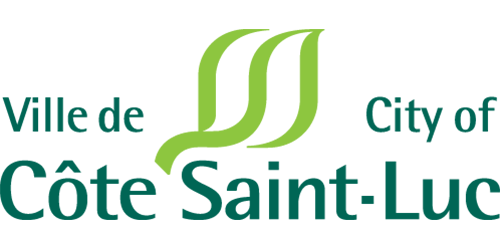Smart Environments Supporting the Ecosystem of Fragile and Isolated Seniors: The City of Côte Saint-Luc Living Lab
As a continuation of The Village Initiative project completed in 2018, the City is once again collaborating with a team of researchers to develop a new support model to help older citizens remain in their homes.
Through the project Smart Environments Supporting the Ecosystem of Fragile and Isolated Seniors, the City of Côte Saint-Luc and its partners wish to create a support ecosystem combining existing services on the city’s territory and a remote monitoring system in the home.

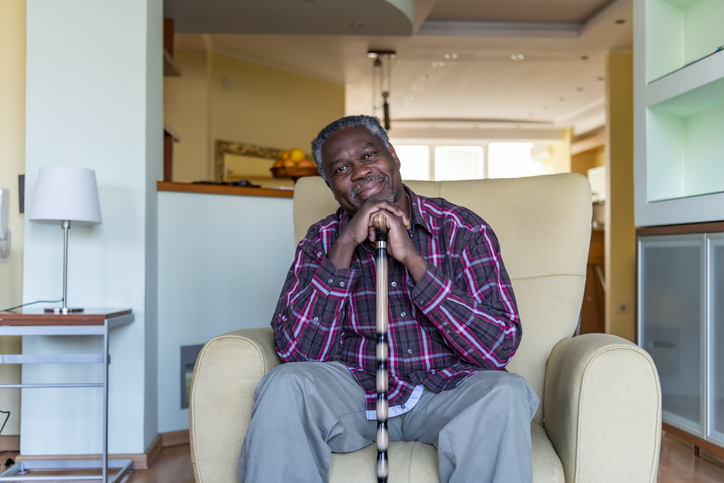
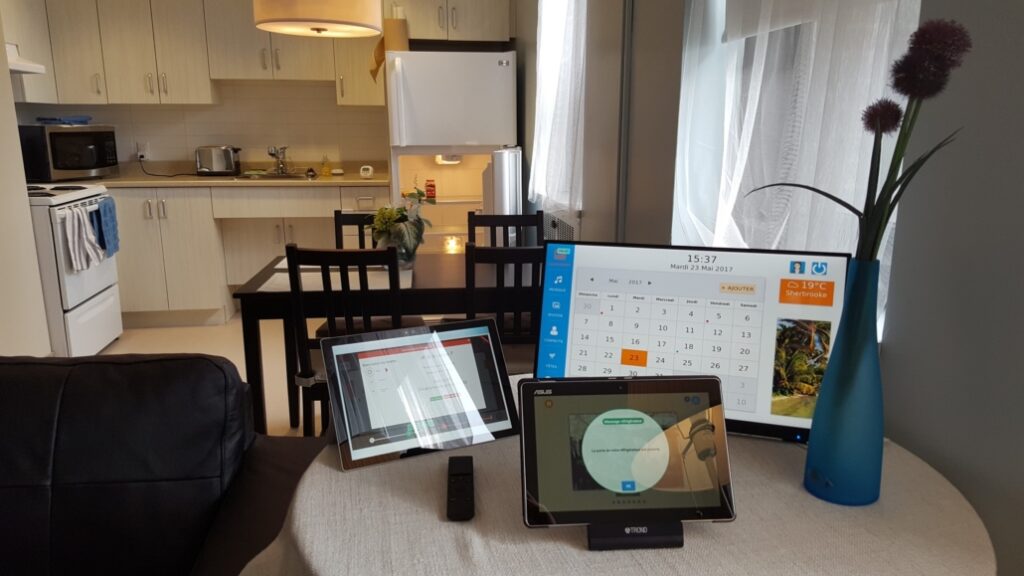
What
The Centre for Research and Expertise in Social Gerontology (CREGÉS) of the CIUSSS West-Central Montreal (CIUSSS CCOMTL), the City of Côte Saint-Luc, and several partners from the research community are carrying out a research project aimed at co-developing, at the scale of the City of Côte Saint-Luc, a model of support around intelligent environments in order to allow older citizens to live at home as long as possible.
« It’s about creating a smart home environment that is integrated into a human support ecosystem. » Mélanie Couture, Chairholder of the Research Chair on Mistreatment of Older adults, Associate Professor, School of Social Work, Université de Sherbrooke, CREGES
Why?
According to the results of the project launched in 2018 by the City of Côte Saint-Luc, The VillAGE Initiative – A Smart Cities project, many older citizens are isolated and fail to obtain all the services they need in order to live at home as long as possible. There is an urgent need to better explore solutions related to smart environments and to the involvement of all stakeholders in home care.
« The city is in the business of delivering service. We do it well. But it’s not enough. » Dida Berku, Councillor, City of Côte Saint-Luc
«I think the City of Côte Saint-Luc’s and our vision of moving care to wherever the patient happens to be are totally aligned. »
Lawrence Rosenberg, President and CEO, CIUSSS CCOMTL
How?
With the City of Côte Saint-Luc’s various partners, co-develop a model of support – an innovation – that would integrate a smart home environment with a human support ecosystem.
Co-development via a Living Laboratory
A living lab is a user-centered innovation ecosystem based on a co-creation methodology, which mobilizes innovation research and development processes in real-life environments.1
Who makes up CSL’s living laboratory?
City of CSL employees and departments
Health and social services sector
Older citizens and their caregivers
Community organizations
Private businesses that provide services to older citizens
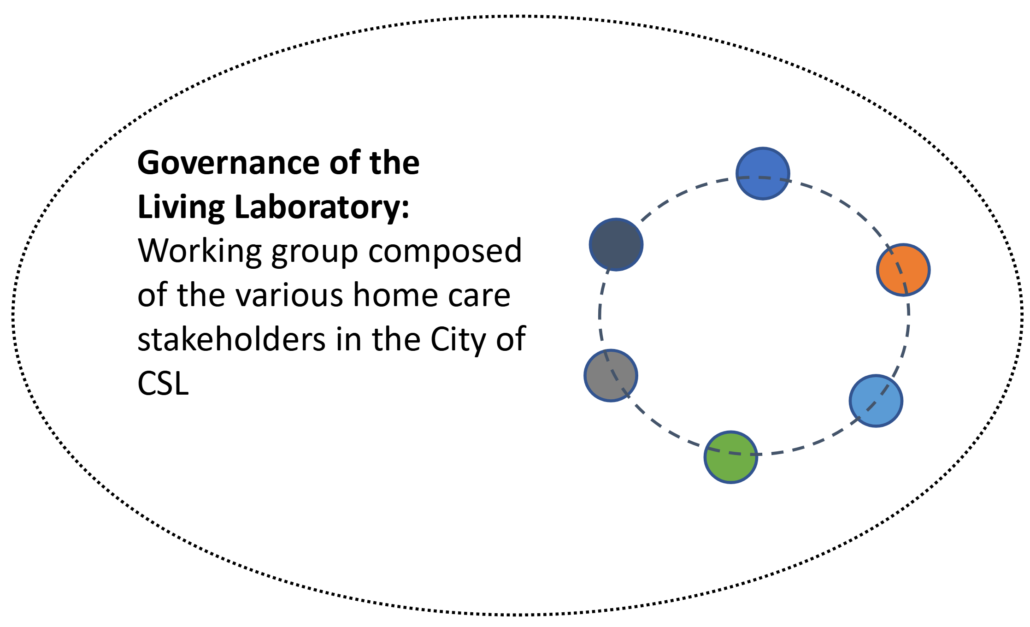
The co-creation activities of the living laboratory

Step 1 : Older citizens survey to understand the existing ecosystem and the acceptability of telemonitoring

Step 2 : Co-design workshops (care mapping) 2 to understand the existing support ecosystem and to develop the new support model integrating technology

Step 3 : Deployment and assessment of the new ecosystem installed in the homes of older citizens of Côte Saint-Luc
1 (Dubé et al., 2014; ENoLL, 2020)
2 https://atlasofcaregiving.com/caremap/
Team and partners
As a living laboratory, this project is based on the close collaboration between the City of Côte Saint-Luc, a team of researchers, older citizens and their families, as well as various partners offering homecare services in the territory.
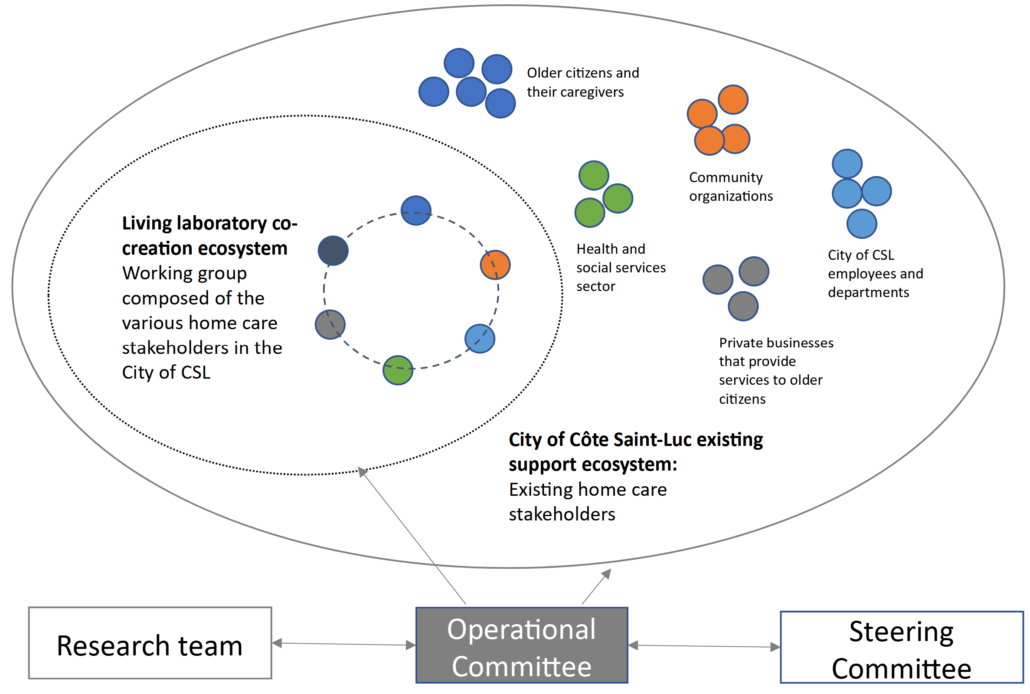
Research team
Role: Responsible for the research component and responsible for ensuring the scientific rigor of the process.
Principal Investigator
- Mélanie Couture, Chairholder of the Research Chair on Mistreatment of Older adults, Associate Professor, School of Social Work, Université de Sherbrooke, CREGES
Project Co-Leads
- Nathalie Bier, Ph.D, École de réadaptation, Université de Montréal, CRIUGM – CIUSSS du Centre-sud-de-l’île de Montréal
- Sylvain Giroux, Ph.D, Informatique, Université de Sherbrooke
Co-researchers
- Kevin Bouchard, Ph.D, Informatique et mathématique, Université du Québec à Chicoutimi
- Carolina Bottari, Ph.D, École de réadaptation, Université de Montréal
- Sébastien Gaboury, Ph.D, Informatique et mathématique, Université du Québec à Chicoutimi
- Charles Gouin-Vallerand, Ph.D, École de la gestion, Université de Sherbrooke
- Guy Paré, Ph.D, Technologies de l’information, HEC Montréal
- Sandra Smele, Ph.D(c), Coordinator of Expertise in Inclusive Aging, Diversity, Health and Well-being, Centre for Research and Expertise in Social Gerontology (CREGÉS), CIUSSS West-Central-Montréal
Operational Committee
Role: Coordination and management of the project
Members
- The principal investigators
- Mijanou Gravelle, CIUSSS COMTL
- Mijanou Gravelle, CIUSSS COMTL
- Dida Berku, City of Côte Saint-Luc
- Tanya Abramovitch, City of Côte Saint-Luc
- Katie Bezaire, Eleanor London Côte Saint-Luc Public Library
- Geneviève Polese, SPMV Quartier 9
Collaborators/Partners
- Regis Aubry, Ph.D, Université de Franche-Comté
- Olivier Beauchet, Ph.D, Centre de recherche de l’Institut universitaire de gériatrie de Montréal
- Xavier Ferré, Ph.D, Universidad Politécnica de Madrid
- Lionel Pazart, Ph.D, Institut national de la santé et de la recherché médicale
- Sylvia Pelayo, Ph.D, Institut national de la santé et de la recherché médicale
- Hélène Pigot, Ph.D, Université de Sherbrooke
- Thomas Tannou, Ph.D, Centre de recherche de l’Institut universitaire de gériatrie de Montréal
- Rosalie Wang, Ph.D, Université de Toronto
Steering Committee
Role: To accompany the living laboratory in the establishment of strategic practices in order to ensure that the project meets its initial objectives and that it will be sustainable.
Members
- The operational committee
- Mitch Browstein, Mayor of CSL
- Dr. Lawrence Rosenberg, President-CEO CIUSSS COMTL
- Luc Méthot, Associate Director Support Program for the Autonomy of Seniors (SAPA), CIUSSS COMTL
- Habiba Boutaleb , Coordinator Support Program for the Autonomy of Seniors (SAPA), CIUSSS COMTL
- Elliot Silverman, Associate Director of Digital Health, CIUSSS COMTL
- Danina Kapetanovic, Directrice de l’innovation, Chief Innovation Officer, OROT
- Beth Fineberg, Cummings
- Nancy Cooperberg, Cummings
- Anne Naimark
- Paula Shuster
- Marc Chriqui, Tech entrepreneur
- Hélène Pigot, Laboratoire Domus, Université de Sherbrooke
- Pascal Beauchesne, NUMANA
- Hasna Rouighi, Directrice du bureau de l’innovation, MSSS
- David Lisbona, Nellie Foundation
